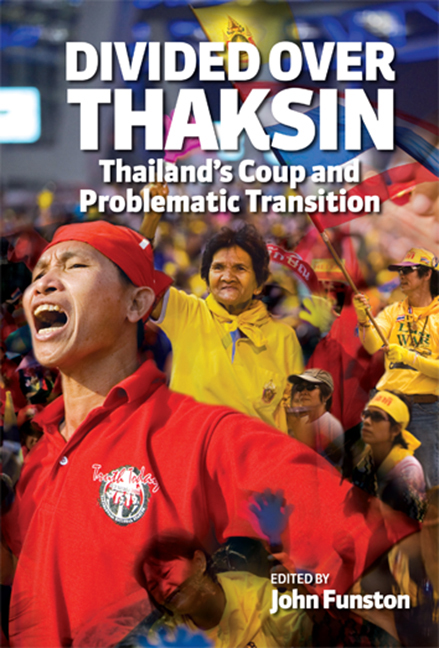Book contents
- Frontmatter
- Contents
- List of Tables and Figures
- List of Contributors
- Preface
- Introduction
- 1 Political Contests in the Advent of Bangkok's 19 September Putsch
- 2 The Tragedy of the 1997 Constitution
- 3 The NESAC, Civil Society, Good Governance and the Coup
- 4 Military Coup and Democracy in Thailand
- 5 Deconstructing the 2007 Constitution
- 6 Thailand's 2007 Constitution and Re-Emerging Democracy: Will Political Polarization Continue?
- 7 Untying the Gordian Knot: The Difficulties in Solving Southern Violence
- 8 Another Country: Reflections on the Politics of Culture and the Muslim South
- 9 Governance in the South: Is Decentralization an Option?
- 10 Tradition and Reform in Islamic Education in Southern Thailand
- 11 The Economy under the Thaksin Government: Stalled Recovery
- 12 The Thai Economy after the Coup
- 13 The Impact of Political Uncertainty on Business
- Index
6 - Thailand's 2007 Constitution and Re-Emerging Democracy: Will Political Polarization Continue?
Published online by Cambridge University Press: 21 October 2015
- Frontmatter
- Contents
- List of Tables and Figures
- List of Contributors
- Preface
- Introduction
- 1 Political Contests in the Advent of Bangkok's 19 September Putsch
- 2 The Tragedy of the 1997 Constitution
- 3 The NESAC, Civil Society, Good Governance and the Coup
- 4 Military Coup and Democracy in Thailand
- 5 Deconstructing the 2007 Constitution
- 6 Thailand's 2007 Constitution and Re-Emerging Democracy: Will Political Polarization Continue?
- 7 Untying the Gordian Knot: The Difficulties in Solving Southern Violence
- 8 Another Country: Reflections on the Politics of Culture and the Muslim South
- 9 Governance in the South: Is Decentralization an Option?
- 10 Tradition and Reform in Islamic Education in Southern Thailand
- 11 The Economy under the Thaksin Government: Stalled Recovery
- 12 The Thai Economy after the Coup
- 13 The Impact of Political Uncertainty on Business
- Index
Summary
The draft constitution which won a majority vote in the referendum on 19 August 2007 has made one thing certain, that is, general elections will be held at the end of the year or early next year at the latest. This indicates that democracy will be brought back to Thailand. The new constitution is supposed to open a new chapter on democratic development in the country. More civil and political rights are recognized, the power and authorities of politicians and public officials will be more restricted, and the system of checks and balances will be more effective. It is hoped that political corruption and the abuse of power by political leaders will be less.
Nevertheless, a pessimistic view remains. Most urban middle-class voters believe that the new constitution cannot make political reforms a reality. Although a majority of them voted for the draft constitution, they believe it cannot prevent those who are loyal to former Prime Minister Thaksin Shinawatra from coming back to power. This is indicated by the outcome of the votes in the referendum.
RESULTS OF THE REFERENDUM
In Thailand' first ever referendum, 57.81 per cent of voters voted for the draft constitution, while 42.19 per cent voted against. What is interesting is that the votes against the draft were very high, and in the north and northeast combined a majority of voters rejected the draft. In the south, which is a strong base of the Democrat Party (a major adversary of Thaksin), a very large majority of the votes were for the draft. A majority of voters in Bangko and in the central region also were in favour of the new constitution.
What do these outcomes tell us? Most analysts believed that the results of the vote reflected the strong influence and popularity of former Prime Minister Thaksin and his Thai Rak Thai Party in the north and the northeast. There have been quite a number of former politicians still loyal to him working at the grass-roots level to mobilize people not to accept the draft constitution and the military' political role. It worked out very well in the north and the northeast where the people continue to support Thaksin' populist policies. The anti-military campaigners also tried to convince the people that the coup on 19 September last year was unjustified and illegitimate.
- Type
- Chapter
- Information
- Divided Over ThaksinThailand's Coup and Problematic Transition, pp. 89 - 95Publisher: ISEAS–Yusof Ishak InstitutePrint publication year: 2009

